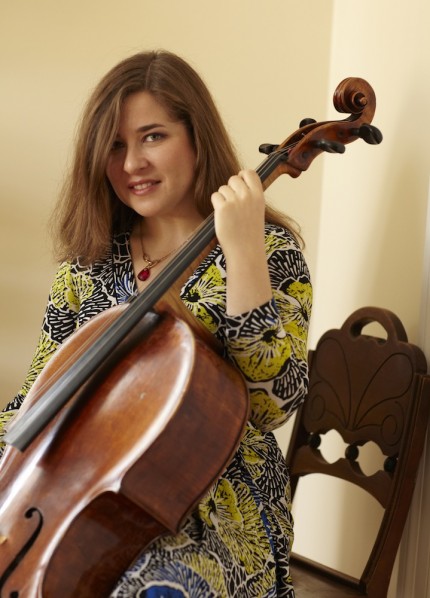Cellist Weilerstein makes a case for Prokofiev rarity with CSO

For the second program in the Chicago Symphony Orchestra’s “Truth to Power” festival, Thursday night’s concert offered a rarity by Prokofiev and a belated Benjamin Britten premiere, alongside one of Shostakovich lighter symphonies.
Few great composers wrote as many not-great works as Serge Prokofiev. For every masterpiece like his Fifth Symphony (which will be heard Saturday and Tuesday), or the ballet Romeo and Juliet, there are twice as many clinkers, including all but two of his symphonies, three of the five piano concertos and several other works.
Among them are his Symphony-Concerto for cello and orchestra, composed for Mstislav Rostropovich. As cumbrous as its title, the work is a third revision of his previously failed attempts at a cello concerto (Nos. 1 and 2). Spanning 37 minutes with an episodic middle movement nearly twice as long as the other two sections combined, the unwieldy concerto possesses fleeting moments of inspiration and showpiece solo opportunities, yet the piece remains awkward and unconvincing, stubbornly refusing to hang together as a unified whole. The fizzing bravura of the central Allegro’s coda, in particular, makes the final movement feel like an anticlimax, and the concerto is undone by slick note-spinning and structural weakness. As Shostakovich said, “Prokofiev too often sacrificed essential things for a flashy effect.”
Alisa Weilerstein’s stellar performance Thursday night with conductor Jaap van Zweden and the CSO provided about as convincing advocacy for this problematic work as one is every likely to hear. The cellist brought a fragile vulnerability and hushed expression to the lyrical passages, most affectingly so in the tender theme of the central movement. Yet the interior moments were balanced with an unbridled virtuosity, the soloist throwing off the work’s many tortuous technical landmines at lightning tempos, with van Zweden and the orchestra providing full-tilt support.
The repeated ovations brought Weilerstein back for a Bach encore, the Bouree I and II from the Cello Suite No. 3, rendered with a gentle lilt that felt just right after the hard-charging concerto finale.
The second half offered two shorter and mostly lighter works. If Shostakovich’s Symphony No. 9 speaks “truth to power” it’s more because of what the work isn’t, than what it is. Stalin and his cultural apparatchiks expected a heroic Ninth Symphony in the Beethoven mode, following Shostakovich’s grandiose wartime Seventh and dark and tragic Eighth.
Instead Shostakovich wrote a slight, jokey symphony that is anything but triumphant, almost in the casual apertif style of his jazz suites. Yet there are undeniable shadows in this work as well, which were clearly manifest in Thursday’s taut CSO performance under van Zweden. The moody, introspective wind solos of the second movement were rendered with dark feeling by the CSO principals. David McGill’s searching, broken-winged bassoon solo in the Largo seems like even more of a personal statement by the composer, perhaps a response to the tub-thumping work expected of him.
Van Zweden has a fine feel for Shostakovich and directed the music with sensitivity and speed where needed. The Allegretto finale felt just right, thrown off with a frenetic insistence that never seemed genuinely cheerful or light-hearted.
Of the handful of Benjamin Britten’s symphonic works, there are few that have not been heard in Chicago yet Thursday’s performance of his Suite on English Folksongs: A time there was…. marked a belated CSO premiere. Britten’s final completed work for orchestra shows characteristic scoring dexterity while avoiding some of the fussy busyness of his piano folksong accompaniments.
Van Zweden led a nimble performance that plumbed a surprising depth in this suite, from the affectionate treatment of “The Bitter Withy” to the satirical march of “Hankin Booby” and the Irish fiddle reel of “Hunt the Squirrel” (Stephanie Jeong leading the CSO violins in a whirling rendition). The final song “Lord Melbourne” makes an apt valedictory farewell by Britten, with Scott Hostetler’s elegiac English horn solo and the flute and strings long, slow fade to silence.
The program will be repeated 1:30 p.m. Friday. cso.org; 312-294-3000.
Posted in Uncategorized




